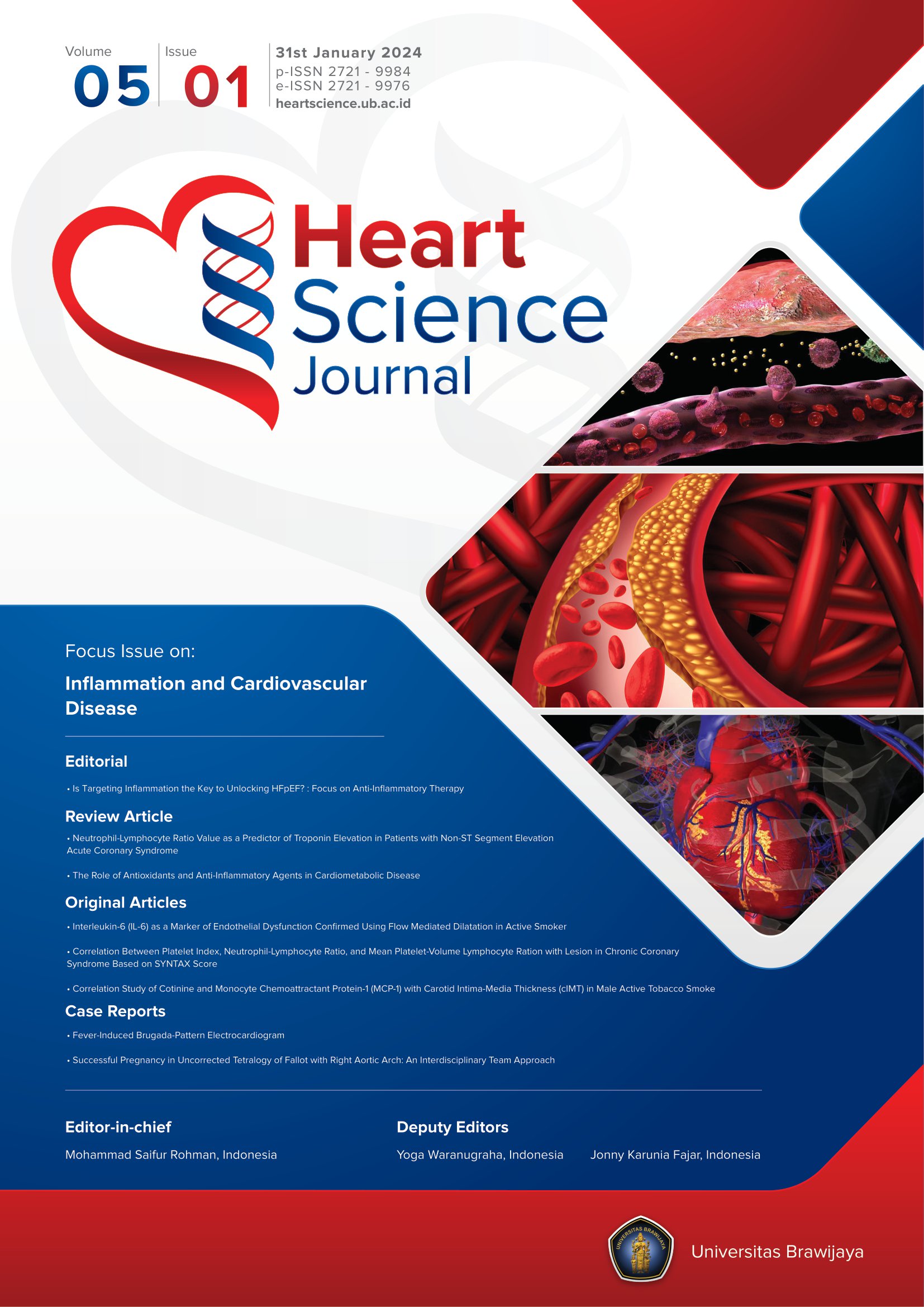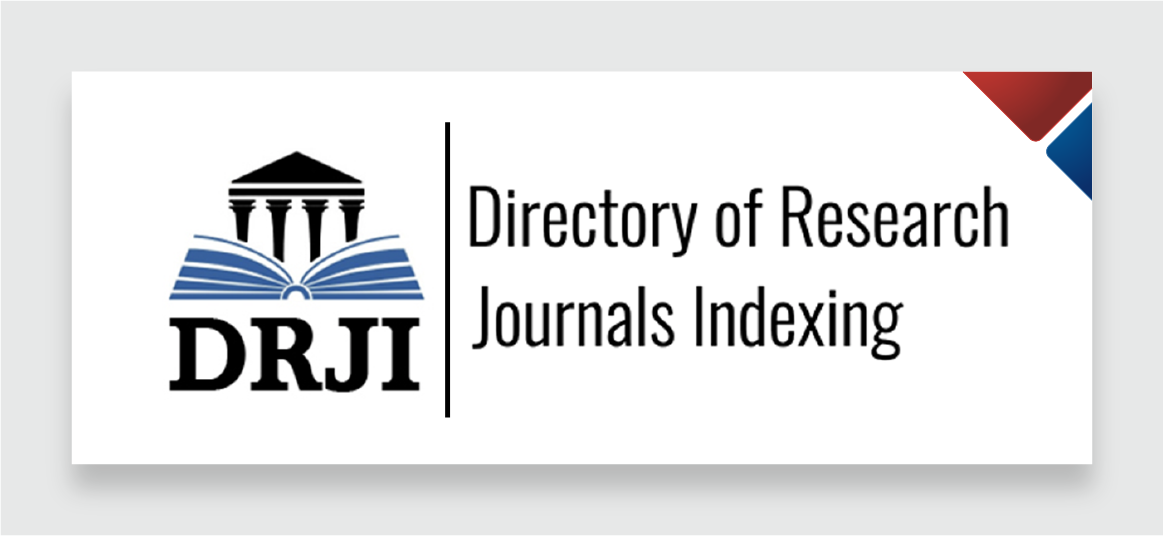Prognostic Value of Residual Syntax Score Combined with Acef Score in Acute Coronary Syndrome Patient After Percutaneus Coronary Intervention in Saiful Anwar Hospital, Malang
Abstract
Background : Percutaneous coronary intervention (PCI) is one of the revascularization options in patients with clinical acute coronary syndrome (ACS) who often have multiple and complex vascular lesions. So, the decision to complete revascularization is still a topic that is widely explored to reduce the rate of rehospitalization and reinfarction. This study aims to determine the predictor value of rehospitalization and reinfarction events that can be used in ACS patients undergoing IKP using coronary angiography parameters with residual SYNTAX scores and clinical parameters using ACEF scores.
Method : The study was cohort prospective with the inclusion criteria being all ACS patients who underwent PCI in RSUD Dr. Saiful Anwar Malang from January 2017 to July 2021. All patients underwent IKP and underwent coronary angiography evaluation after IKP with a residual SYNTAX score (rSS) and divided into categories into rSS≤8 and rSS>8. All patients underwent laboratory examination of serum creatinine and post-PCI echocardiography, and an ACEF score was obtained (ACEF score = age/left ventricular ejection fraction + 1 [if serum creatinine >2 mg/dl]). Research subjects will be followed up for at least 1 year related to the incidence of post-PCI rehospitalization and reinfarction.
Results : From a total sample of 209 patients, it was found that the residual SYNTAX score data had the most significant predictive factor for the occurrence of rehospitalization at 1 year after PCI (OR 6.14 [95% CI, 1.92-1967]). At the value of rSS > 8, (AUC 0.750 [95% CI, 0.682-0.818], p 0.001) has a good predictive value for the occurrence of rehospitalization. However, combining with clinical parameters using the ACEF score provides a better predictive value. This study shows that the combination of rSS>8 and ACEF score>1.2 provides a better predictive value (AUC 0.884 [95%CI, 0.832-0.936) for the incidence of rehospitalization in post-PCI ACS patients.
Conclusion : Acute coronary syndrome patients with residual SYNTAX scores > 8 and ACEF scores > 1.2 had a strong predictive value for rehospitalization events 1 year after PCI. The use of the combination of these two scores is expected to be a clinical guide to obtain the degree of completeness of revascularization in ACS patients.
Keywords
Full Text:
PDFReferences
Perhimpunan Dokter Spesialis Kardiovaskular Indonesia. Pedoman tata laksana sindrom koroner akut. Edisi ke-4. Jakarta: PERKI; 2018.
Bohula E, Morrow D. ST-elevation myocardial infarction: management. Dalam: Zipes DP, Libby P, Bonow RO, editors. Braunwald’s Heart Disease: a Textbook of Cardiovascular Medicine. 11th Edition. Philadelphia, PA: Elsevier; 2018.
Mishra A, Prajapati J, Dubey G, Patel I, Mahla M, Bishnoi S, dkk. Characteristics of ST-elevation myocardial infarction with failed thrombolysis. Asian Cardiovasc Thorac Ann. 2020;28(5):266-72.
Zhang Y, Huo Y. Early reperfusion strategy for acute myocardial infarction: a need for clinical implementation. J Zhejiang Univ Sci B. 2011;12(8):629-32.
Perhimpunan Dokter Spesialis Kardiovaskular Indonesia. Pedoman Tata Laksana Sindrom Koroner Akut. Jakarta. 2018.
French JK, Burgess S, Chew DP. Re-infarction after primary percutaneous coronary intervention. Current opinion in cardiology. 2015 Jul 1;30(4):354-8.
al MGe. 2013 ESC guidelines on the management of stable coronary artery disease. European Heart Journal. 2013; 34(38):2949-3003.
Piccolo R, Giustino G, Mehran R, et al. Stable coronary artery disease: revascularisation and invasive strategies. The Lancet. 2015;386(9994):702-713.
Garcia S, Sandoval Y, Roukoz H, et al. Outcomes after complete versus incomplete revascularization of patients with multivessel coronary artery disease: a meta-analysis of 89,883 patients enrolled in randomized clinical trials and observational studies. Journal of the American College of Cardiology. 2013;62(16):1421-1431.
Song Y, Gao Z, Tang X, Jiang P, Xu J, Yao Y, Li J, Zhao X, Qiao S, Yang Y, Gao R. Impact of residual SYNTAX score on clinical outcomes after incomplete revascularisation percutaneous coronary intervention: a large single-centre study. EuroIntervention: journal of EuroPCR in collaboration with the Working Group on Interventional Cardiology of the European Society of Cardiology. 2017 Nov;13(10):1185-93.
Mann DL, Zipes DP, Libby P, Bonow RO. Braunwald's heart disease: a textbook of cardiovascular medicine. Elsevier Health Sciences; 2014.
Tern PJW, Ho AKH, Sultana R, Ahn Y, Almahmeed W, Brieger D, dkk. Comparative overview of ST-elevation myocardial infarction (STEMI) epidemiology, demographics, management and outcome in 5 Asia-Pacific countries – a meta-analysis. Eur Heart J Qual Care Clin Outcomes. 2020 (accepted manuscript).
Dharma S, Andriantoro H, Purnawan I, Dakota I, Basalamah F, Hartono B, dkk. Characteristics, treatment and in-hospital outcomes of patients with STEMI in a metropolitan area of developing country: an initial report of the extended Jakarta Acute Coronary Syndrome registry. BMJ Open. 2016;6:e012193
Erne P, Radovanovic D, Schoenenberger AW, et al. Impact of hypertension on the outcome of patients admitted with acute coronary syndrome. J Hypertens. 2015;33:860‐867.
Abrignani M, Dominguez L, Biondo G, et al. In‐hospital complications of acute myocardial infarction in hypertensive subjects. Am J Hypertens. 2005;18:165‐170.
Braga CG, Cid-Alvarez AB, Diéguez AR, Alvarez BA, Otero DL, Sánchez RO, Pena XS, Salvado VG, Trillo-Nouche R, González-Juanatey JR. Prognostic impact of residual SYNTAX score in patients with ST-elevation myocardial infarction and multivessel disease: analysis of an 8-year all-comers registry. International journal of cardiology. 2017 Sep 15;243:21-6.
Song Y, Gao Z, Tang X, Jiang P, Xu J, Yao Y, Li J, Zhao X, Qiao S, Yang Y, Gao R. Impact of residual SYNTAX score on clinical outcomes after incomplete revascularisation percutaneous coronary intervention: a large single-centre study. EuroIntervention: journal of EuroPCR in collaboration with the Working Group on Interventional Cardiology of the European Society of Cardiology. 2017 Nov 1;13(10):1185-93.
Wykrzykowska JJ, Garg S, Onuma Y, de Vries T, Goedhart D, Morel MA, van Es GA, Buszman P, Linke A, Ischinger T, Klauss V. Value of age, creatinine, and ejection fraction (ACEF score) in assessing risk in patients undergoing percutaneous coronary interventions in the ‘all-comers' leaders trial. Circulation: Cardiovascular Interventions. 2011 Feb;4(1):47-56.
Biondi-Zoccai G, Romagnoli E, Castagno D, Sheiban I, De Servi S, Tamburino C, Colombo A, Burzotta F, Presbitero P, Bolognese L, Paloscia L. Simplifying clinical risk prediction for percutaneous coronary intervention of bifurcation lesions: the case for the ACEF (age, creatinine, ejection fraction) score. EuroIntervention: journal of EuroPCR in collaboration with the Working Group on Interventional Cardiology of the European Society of Cardiology. 2012 Jul 1;8(3):359-67.
Gao G, Zhang D, Song C, Xu H, Yin D, Guan C, Yang Y, Xu B, Dou K. Integrating the residual SYNTAX score to improve the predictive ability of the age, creatinine, and ejection fraction (ACEF) score for cardiac mortality in percutaneous coronary intervention patients. Catheterization and Cardiovascular Interventions. 2020 Feb;95:534-41.
Sebastian G, Pillai V, Manzil A, Damodara R, Kalra I, Abdul Z, Mathew O. Comparison of multiple risk scores in assessing medium-to long-term clinical outcomes in unstable angina/non-ST-elevation myocardial infarction patients undergoing multi vessel percutaneous coronary intervention: An observational, registry-based study in India. Indian Heart Journal. 2021 Aug 5.
Stähli BE, Wischnewsky MB, Jakob P, Klingenberg R, Obeid S, Heg D, Räber L, Windecker S, Roffi M, Mach F, Gencer B. Predictive value of the age, creatinine, and ejection fraction (ACEF) score in patients with acute coronary syndromes. International journal of cardiology. 2018 Nov 1;270:7-13.
Kashiwagi D, Ebisawa S, Yui H, Maruyama S, Nagae A, Sakai T, Kato T, Saigusa T, Okada A, Motoki H, Kuwahara K. Prognostic usefulness of residual SYNTAX score combined with clinical factors for patients with acute coronary syndrome who underwent percutaneous coronary intervention from the SHINANO Registry. Heart and Vessels. 2021 Feb;36(2):170-9.
DOI: https://doi.org/10.21776/ub.hsj.2022.003.01.4
Refbacks
- There are currently no refbacks.
Copyright (c) 2022 Adhika Prastya Wikananda, Mohammad Saifur Rohman, Novi Kurnianingsih, Sasmojo Widito, Ardian Rizal

This work is licensed under a Creative Commons Attribution 4.0 International License.









